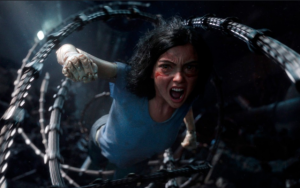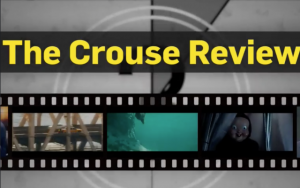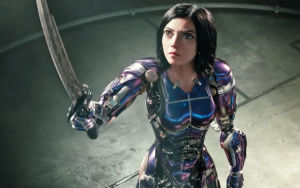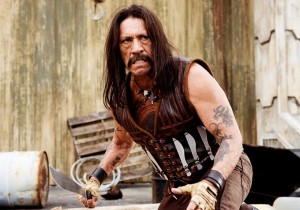RICHARD’S WEEKEND MOVIE REVIEWS FROM CP24! FRIDAY FEBRUARY 15, 2019.
 Richard joins CP24 anchor Jee-Yun Lee to have a look at the weekend’s new movies including ‘Alita: Battle Angel,’ ‘Level 16‘ and ‘Isn’t It Romantic.’
Richard joins CP24 anchor Jee-Yun Lee to have a look at the weekend’s new movies including ‘Alita: Battle Angel,’ ‘Level 16‘ and ‘Isn’t It Romantic.’
Watch the whole thing HERE!
 Richard joins CP24 anchor Jee-Yun Lee to have a look at the weekend’s new movies including ‘Alita: Battle Angel,’ ‘Level 16‘ and ‘Isn’t It Romantic.’
Richard joins CP24 anchor Jee-Yun Lee to have a look at the weekend’s new movies including ‘Alita: Battle Angel,’ ‘Level 16‘ and ‘Isn’t It Romantic.’
Watch the whole thing HERE!
 Richard sits in with CTV NewsChannel anchor Marcia McMillan to have a look at the weekend’s big releases including ‘Alita: Battle Angel,’ ‘Happy Death Day 2U,’ and ‘Level 16‘ and ‘Isn’t It Romantic.’
Richard sits in with CTV NewsChannel anchor Marcia McMillan to have a look at the weekend’s big releases including ‘Alita: Battle Angel,’ ‘Happy Death Day 2U,’ and ‘Level 16‘ and ‘Isn’t It Romantic.’
Watch the whole thing HERE!
 Richard has a look at the romantic satire “Isn’t It Romantic,” the CGI cyborg of “Alita: Battle Angel” and the time spun “Happy Death Day 2U” with CFRA Morning Rush guest host Kristy Cameron.
Richard has a look at the romantic satire “Isn’t It Romantic,” the CGI cyborg of “Alita: Battle Angel” and the time spun “Happy Death Day 2U” with CFRA Morning Rush guest host Kristy Cameron.
Listen to the whole thing HERE!
 From ctvnews.ca: Film critic and ‘Pop Life’ host Richard Crouse reviews three new movies this week: ‘Alita: Battle Angel,’ ‘Happy Death Day 2U,’ and ‘Level 16‘ and ‘Isn’t It Romantic.’ Read the whole things HERE!
From ctvnews.ca: Film critic and ‘Pop Life’ host Richard Crouse reviews three new movies this week: ‘Alita: Battle Angel,’ ‘Happy Death Day 2U,’ and ‘Level 16‘ and ‘Isn’t It Romantic.’ Read the whole things HERE!
 A weekly feature from from ctvnews.ca! The Crouse Review is a quick, hot take on the weekend’s biggest movies! This week Richard looks at anti-rom-com “Isn’t It Romantic,” the cyborg actiooner “Alita: Battle Angel” and the time warped “Happy Death Day 2U.”
A weekly feature from from ctvnews.ca! The Crouse Review is a quick, hot take on the weekend’s biggest movies! This week Richard looks at anti-rom-com “Isn’t It Romantic,” the cyborg actiooner “Alita: Battle Angel” and the time warped “Happy Death Day 2U.”
Watch the whole thing HERE!
 Richard sits in on the CJAD Montreal morning show with host Andrew Carter to talk about the romantic satire “Isn’t It Romantic,” the CGI orgy of “Alita: Battle Angel” and the time spun “Happy Death Day 2U.”
Richard sits in on the CJAD Montreal morning show with host Andrew Carter to talk about the romantic satire “Isn’t It Romantic,” the CGI orgy of “Alita: Battle Angel” and the time spun “Happy Death Day 2U.”
Listen to the whole thing HERE!
 “There ain’t nothin’ in the world like a big eyed girl to make Christoph Waltz act so funny. Five years ago he played Walter Keane, the wannabe artist who wrongly took credit for his wife Margaret’s phenomenally successful paintings of sad looking kids with enormous eyes. He returns to screens this weekend as a mentor to a cyborg heroine who looks like she stepped out of one of Keane’s paintings.
“There ain’t nothin’ in the world like a big eyed girl to make Christoph Waltz act so funny. Five years ago he played Walter Keane, the wannabe artist who wrongly took credit for his wife Margaret’s phenomenally successful paintings of sad looking kids with enormous eyes. He returns to screens this weekend as a mentor to a cyborg heroine who looks like she stepped out of one of Keane’s paintings.
Set in 2563, three hundred years after “the fall,” a deadly war, the story takes place in the dangerous and dystopian Iron City. Overcrowded and violent, the city doesn’t even have police, just Hunter Warriors who track down criminals for cash.
The action kicks off when the kind-hearted cybersurgeon Dr. Dyson Ido (Waltz) finding the cast-off “core” of Alita (Rosa Salazar) an abandoned cyborg with amnesia, discarded in a scrapyard. “I guess I’m an insignificant girl,” she says later, “thrown out with the rest of the garbage.”
Recognizing that there is more to her than metal and wiring, he takes her in, and like a high tech Dr. Frankenstein pieces together a body for her abandoned head and shoulders. He cares for her as if she was his daughter, attempting to give her a normal life despite the fact that there is very little normal about her. Sure, she giggles like a teenage girl and develops a love-at-first-sight crush on Hugo (Keean Johnson), but strange flickers of memory keep popping into her head.
Fragments of her former life come back when she least expects it. When she rescues a dog from danger an old instinct kicks in and she shows remarkable agility and speed. Later, when Hugo teaches her to play Motorball—sort of parkour on rollerblades—she displays incredible skill.
Turns out triggers recollections of her warrior past, providing clues to who she once was. As her true identity emerges—turns out she is one of the most advanced cyborg weapons ever made—sinister forces in Iron City including Motorball impresario Vector (Mahershala Ali) and the world-weary Chiren (Jennifer Connelly), want her stopped. At stake is not just her survival but the survival of Iron City, and everyone in it. “I do not stand by in the presence of evil,” she says.
Loosely based on Yukito Kishiro’s original manga, with a focus on the first four books, “Alita: Battle Angel” provides director Robert Rodriguez with lots of material for world building. Perhaps too much. Each main character has a backstory, whether it is in Iron City or the Eden-like floating world of Zalem. There’s hundreds of years of history to establish, the rules to Motorball and, of course, the blending of Alita’s two lives, past and present. There’s a lot going on. Exposition abounds and with the frenzy of plot it is inevitable there will be shards of unanswered and unexplored left by the time the end credits roll. Add to that a cliffhanger ending that doesn’t feel like an ending, more like Rodriguez simply ran out of film, and you have a movie more concerned with its franchise possibilities than telling a complete story.
“Alita: Battle Angel” is a feast of imaginative CGI, driven by large scale spectacle but, like its main character, has a synthetic heart.
 Robert Rodriguez, co-director of Sin City: A Dame to Kill For, has assembled an impressive cast of marquee names for the long awaited followup to 2005’s Sin City.
Robert Rodriguez, co-director of Sin City: A Dame to Kill For, has assembled an impressive cast of marquee names for the long awaited followup to 2005’s Sin City.
Actors like Jessica Alba, Rosario Dawson and Bruce Willis are returning from the first instalment, while newcomers to the series include Joseph Gordon-Levitt, Eva Green and Josh Brolin.
Rodriguez welcomes back another name, Lady Gaga, who he first cast in Machete Kills.
“When I asked if she was interested in acting she said, ‘I studied acting and I always wanted to be in one of your movies because of the theatricality and the showmanship.”
When she finished shooting her role of a deadly assassin in Machete Kills, Rodriguez tweeted, “Holy Smokes. Blown away!” and promptly cast the singer in A Dame to Kill For.
For years, directors have looked to musicians to bring their natural charisma to the screen. Perhaps no one more than Nicolas Roeg has explored the potential for rock stars to become movie stars. “They have,” he said, “a greater ability to light up the screen than actors.”
In 1970 Roeg and co-director Donald Cammell made the psychedelic crime drama Performance, starring Mick Jagger in his first on screen role. The Rolling Stone played the mysterious Mr. Turner, a jaded former rock star who gives shelter to a violent East London gangster (James Fox). In 2009 Film Comment declared Mick Jagger’s Turner the best performance by a musician in a movie.
Next came The Man Who Fell to Earth, an existential sci-fi film about an extraterrestrial named Thomas Jerome Newton, starring a perfectly cast David Bowie in his feature film debut. Roeg says he “really came to believe that Bowie was a man who had come to Earth from another galaxy. His actual social behavior was extraordinary. He seemed to be alone — which is what Newton is in the film — isolated and alone.”
Finally, Bad Timing was advertised as a “terrifying love story” and called “a sick film made by sick people for sick people” by its own distributor. Art Garfunkel, of 60s folk duo Simon and Garfunkel, stars as a psychology professor living in Vienna whose sadistic relationship with a pill addicted woman (Theresa Russell) ends with a battle for her life. The sexually explicit film was difficult for the actors, and at one point Garfunkel even wanted out. Over martinis Roeg told his nervous actor, “I must ask you to trust that I know where I’m going. It’s a maze, but there is an end to it.’”
Garfunkel stayed on, delivering a performance that the New York Times called “very credible.”
 In “Machete Kills,” the further adventures of Robert Rodriguez’s titular vengeance seeking ex-Mexican federale, the director comes up with new ways to cut a person in half. For the first time (in my memory anyway) a human being is bisected down the middle from cranium to crotch.
In “Machete Kills,” the further adventures of Robert Rodriguez’s titular vengeance seeking ex-Mexican federale, the director comes up with new ways to cut a person in half. For the first time (in my memory anyway) a human being is bisected down the middle from cranium to crotch.
Unfortunately it’s the only new idea in a movie that slavishly pays tribute to el cheapo grindhouse flicks.
Danny Trejo is back and badder-than-ever as Machete. The man with the deadly machete is on the biggest caper of his career. Recruited by the President of the United States (Carlos Estevez)—with the lure of a green card—his mission is to find Marcos “the Madman” Mendes (Demian Bichir), a mentally unstable man turned terrorist who lives in an Aztec ruin along with a private army and a rocket aimed at Washington. “You know Mexico,” POTUS says to our hero. “Hell, you are Mexico!”
The trail to Mendes is littered with colourful characters, including a “man eating” madame (Sofía Vergara), a mysterious bounty hunter called El Cameleón (no spoilers here!) and billionaire arms dealer Luther Voz (Mel Gibson).
“Machete Kills” echoes the arch performances, over-the-top violence and cheeseball dialogue off the grainy old grindhouse movies that inspired Rodriguez in the first place. He nails the look and feel of those not-so-classic films—although he relies a bit too heavily on computer-generated gore over good old-fashioned special effects—but this time out he misses the spirit that made them great. I guess it’s harder to make a good bad movie than I thought.
It starts strong with a wild action sequence jammed with spraying splatter and gory gags. Stretch that out to a tight eighty-five minutes and “Machete Kills” would have been a fun guilty pleasure Saturday afternoon matinee. At one-hour-and-forty-five minutes, however, it feels drawn out, filled with scenes that seem to exist only to wedge another celebrity cameo into the story.
Trejo oozes grindhouse cool, but the movie itself commits an exploitation film sin—it’s dull. Scenes lumber along, blandly bereft of wit. Worse, the kitsch value that made “Grindhouse” and the first “Machete” movie so much fun is almost completely absent.
The movie begins with a grainy fake trailer for “Machete Kills Again… In Space,” the proposed third part of the saga. It’s a campy throwback to a simpler time and it’s a bit of fun. But at 2 minutes it also hammers home the point that a little Machete goes a long way.